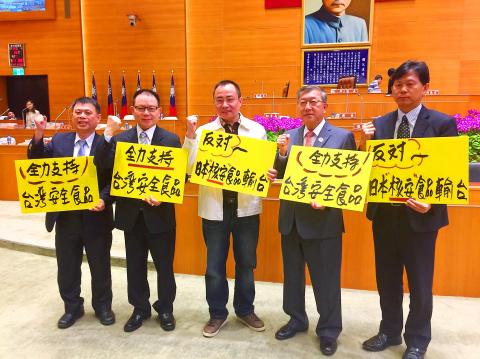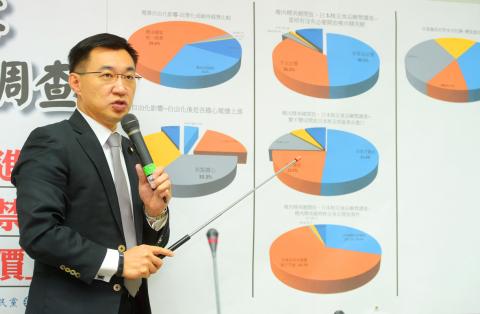Premier Lin Chuan (林全) yesterday reaffirmed the government’s plan to lift a ban on Japanese food products from five radiation-affected prefectures, saying that the deregulation would be carried out scientifically and gradually, while confirming that extra public hearings are planned after the 10 held over the weekend and on Monday ended in chaos due to protesters’ interference.
Taiwan and China are the only two nations that maintain a ban on food imports from the Japanese prefectures of Fukushima, Ibaraki, Tochigi, Gunma and Chiba, but Taiwan has to adopt a scientific approach to the food safety issue, as the ban creates an unfair trading environment, Lin said on Monday during a televised interview.
“Scientifically speaking, if the products pose no health risk, should we not reopen [imports of banned Japanese food] like other nations?” Lin said. “From a free trade perspective, it is absolutely unreasonable to prohibit products that are not radioactively contaminated.”

Photo: Tsai Meng-shang, Taipei Times
The nation has suspended food imports from the five prefectures since the Fukushima Dai-ichi nuclear power plant disaster in March 2011.
Lin said that the ban would be lifted partially and conditionally, as food products from Fukushima Prefecture are to remain banned and products from Ibaraki, Tochigi, Gunma and Chiba are to be allowed conditionally, while aquatic products and wild mushrooms from those prefectures would remain prohibited.
Produce from the Ibaraki, Tochigi, Gunma and Chiba have been collectively and mistakenly described as radioactively contaminated, Lin said, likening the prefectures to Changhua and Miaoli counties’ proximity to nuclear power plants in New Taipei City.

Photo: Chang Chia-ming, Taipei Times
The government will not lift the ban on products considered to be risky to consumers, even if they are allowed to circulate in Japan, such as foods that are prohibited for people younger than 18 due to high radioactivity.
“Our standards will only be stricter, not more relaxed, than those of Japan,” Lin said.
Lin’s remarks were aimed at easing public concern about the proposed lifting of the ban, as the controversy surrounding the issue has escalated, with protesters paralyzing 10 public hearings held by the Cabinet on the issue, while a Democratic Progressive Party (DPP) lawmaker has publicly opposed the proposal.
Lin said he regretted violence at the hearings, adding that the government has not yet finalized a deregulation plan and welcomes the public’s opinions.
“The new government has been dealing with unfair trade [regulations] on Japanese food imports at a gradual pace, but the government does not have to lift the ban now,” Lin said.
The Japanese government complained about Taiwan’s strict import rules well before the DPP took power in May, and Japanese trade representatives paid him a visit when he was running a DPP think tank, Lin said.
He rejected allegations that the proposed easing was made in exchange for closer economic ties and a meeting between People First Party James Soong (宋楚瑜) and Japanese Prime Minister Shinzo Abe at this weekend’s APEC summit, at which Soong is to represent President Tsai Ing-wen (蔡英文).
“The allegations are too far-fetched, too unrealistic. I have to say that there is no such a thing,” he said.
Lin confirmed that extra public hearings on lifting the ban would be held, but did not specify how many or when they would take place.
Meanwhile, the legislature yesterday failed to reach a consensus on the issue, as DPP lawmakers did not show up for a cross-caucus negotiation.
The Chinese Nationalist Party (KMT) caucus has demanded that a Taiwan-Japan mutual judicial assistance agreement be signed before the ban on food products from Japan’s radiation-affected regions be lifted.
The New Power Party caucus has called for the establishment of a Taiwan-Japan investigation and evaluation team, saying no imports should be allowed before the team presents a comprehensive report to the legislature.
Additional reporting by CNA

The CIA has a message for Chinese government officials worried about their place in Chinese President Xi Jinping’s (習近平) government: Come work with us. The agency released two Mandarin-language videos on social media on Thursday inviting disgruntled officials to contact the CIA. The recruitment videos posted on YouTube and X racked up more than 5 million views combined in their first day. The outreach comes as CIA Director John Ratcliffe has vowed to boost the agency’s use of intelligence from human sources and its focus on China, which has recently targeted US officials with its own espionage operations. The videos are “aimed at

STEADFAST FRIEND: The bills encourage increased Taiwan-US engagement and address China’s distortion of UN Resolution 2758 to isolate Taiwan internationally The Presidential Office yesterday thanked the US House of Representatives for unanimously passing two Taiwan-related bills highlighting its solid support for Taiwan’s democracy and global participation, and for deepening bilateral relations. One of the bills, the Taiwan Assurance Implementation Act, requires the US Department of State to periodically review its guidelines for engagement with Taiwan, and report to the US Congress on the guidelines and plans to lift self-imposed limitations on US-Taiwan engagement. The other bill is the Taiwan International Solidarity Act, which clarifies that UN Resolution 2758 does not address the issue of the representation of Taiwan or its people in

SHIFT: Taiwan’s better-than-expected first-quarter GDP and signs of weakness in the US have driven global capital back to emerging markets, the central bank head said The central bank yesterday blamed market speculation for the steep rise in the local currency, and urged exporters and financial institutions to stay calm and stop panic sell-offs to avoid hurting their own profitability. The nation’s top monetary policymaker said that it would step in, if necessary, to maintain order and stability in the foreign exchange market. The remarks came as the NT dollar yesterday closed up NT$0.919 to NT$30.145 against the US dollar in Taipei trading, after rising as high as NT$29.59 in intraday trading. The local currency has surged 5.85 percent against the greenback over the past two sessions, central

US Indo-Pacific Commander Admiral Samuel Paparo on Friday expressed concern over the rate at which China is diversifying its military exercises, the Financial Times (FT) reported on Saturday. “The rates of change on the depth and breadth of their exercises is the one non-linear effect that I’ve seen in the last year that wakes me up at night or keeps me up at night,” Paparo was quoted by FT as saying while attending the annual Sedona Forum at the McCain Institute in Arizona. Paparo also expressed concern over the speed with which China was expanding its military. While the US